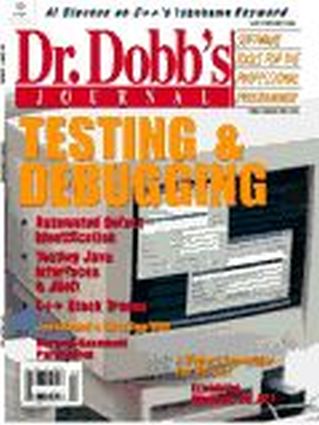
Editorial
[author : Jonathan Erickson] #Edito
TABLE OF CONTENTS
FEATURES
Automated Defect Identification
[author : Kevin Smith]
The techniques Kevin presents here help you quickly identify latent defects in C++ code—without extensive testing or simulation.
Testing Java Interfaces With JUnit
[author : Matt Albrecht]
The GroboUtils JUnit Extension lets you write tests for inherited logic, leading to better maintainability and lower test-development costs.
C++ Stack Traces
[author : Noam Cohen]
Collecting call stack data only when applications crash has limitations. The tool Noam presents here collects information in real time, thereby providing a context in which certain errors occur.
A Java-Based Music Player for MP3, Ogg, & WAV
[author : Sing Li]
Here's a digital music player built around the JavaSound API that supports real-time decoding/playback of music in MP3, WAV, and Ogg Vorbis formats.
Bargain-Basement Parallelism
[author : Timothy Rolfe]
The UNIX multiprocessing fork command lets you take advantage of underutilized processors in dual-processor computers.
A Report Generator for PC-Lint
[author : Jon Zyzyck]
PC-Lint, from Gimpel Software, finds bugs, glitches, and other anomalies in C/C++ code. Jon's report generator reads in all PC-Lint messages and displays them sorted by message number.
EMBEDDED SYSTEMS
Examining Windows CE .NET
[author : Martin Timmerman]
Martin examines Windows CE .NET's thread handling and advanced interrupt handling capabilities, as well as its synchronization mechanisms and network stack performance.
COLUMNS
C Programming
[author : Al Stevens]
Standard C++ added typename to solve semantic ambiguities introduced by the class template mechanism and to make template declarations more intuitive.
Embedded Space
[author : Ed Nisley]
When it comes to wireless devices, antennas—and wavelength—matter.
Programmer's Bookshelf
[author : Gregory V. Wilson]
Greg examines Debugging, by David J. Agans; Translucent Databases, by Peter Wayner; The Turk: The Life and Times of the Famous Eighteenth-Century Chess-Playing Machine, by Tom Standage; Network Security with OpenSSL, by John Viega, Matt Messier, and Pravir Chandra; and Web Metrics: Proven Methods for Measuring Web Site Success, by Jim Sterne.
FORUM
Letters
[author : you]
The New Adventures of Verity Stob
[author : Verity Stob]
News & Views
[author : Shannon Cochran]
Of Interest
[author : Della Song]
Swaine's Flames
[author : Michael Swaine]